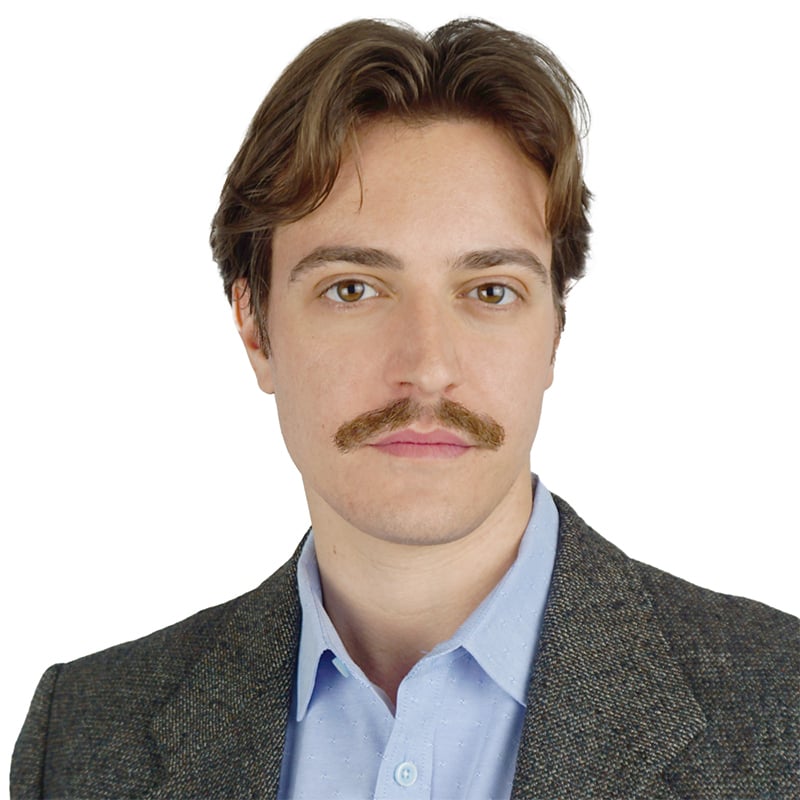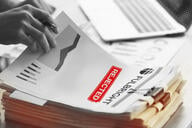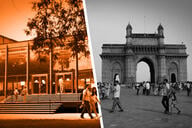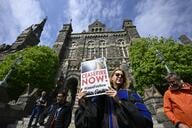You have /5 articles left.
Sign up for a free account or log in.
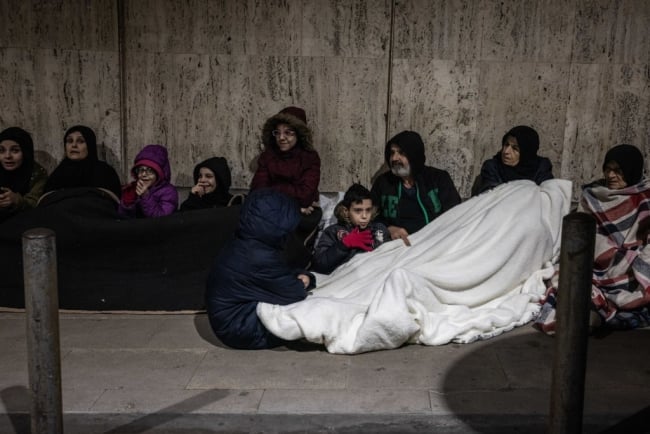
Displaced Lebanese huddle in front of the American University of Beirut’s medical center on Nov. 26, the night of the ceasefire with Israel.
Ed Ram/Getty Images
When Israel and Hezbollah brokered a ceasefire agreement last week, Dr. Fadlo Khuri breathed a sigh of relief. But he’s not resting easy.
The American University of Beirut, where Khuri is president, had started its fall semester in crisis. In the wake of Israel’s invasion of Lebanon in June, months of bombings and reprisals threw the capital into chaos, killing thousands and displacing many more.
Khuri, who has led AUB since 2015, is used to conflict; he’s seen the institution through a financial collapse, a short-lived revolution and a pandemic. But the extent of the violence over the past few months shocked him. Two AUB students and a staff member were killed by Israeli bombs. Resounding explosives provided a soundtrack to campus life when classes weren’t canceled. Displaced civilians set up tent encampments around the university, unsure where else to turn.
When Khuri spoke with Inside Higher Ed on Monday, he’d just returned from an international trip to cement partnerships with universities in the U.K., U.S. and Australia, in case worsening violence forced students to finish their semester elsewhere. After the ceasefire, Khuri said he hopes for a “prolonged period of peace and quiet.” But he knows there haven’t been many of those in the university’s modern history.
AUB presidents have been kidnapped and assassinated. The 150-plus-year-old university has survived civil wars, refugee crises, countless bombardments and conflicts with neighboring Israel—even the collapse of the Ottoman Empire. Khuri said the past year has been one of the most difficult in the institution’s history; he’s sure it will survive this, too.
“My perspective is, you can’t just manage the crisis of the moment. You’ve got to plan what you’re going to do down the line to overcome those losses and rebuild,” he said. “People want to rise to the occasion, rally to the crisis. But they always need to see the next horizon.”
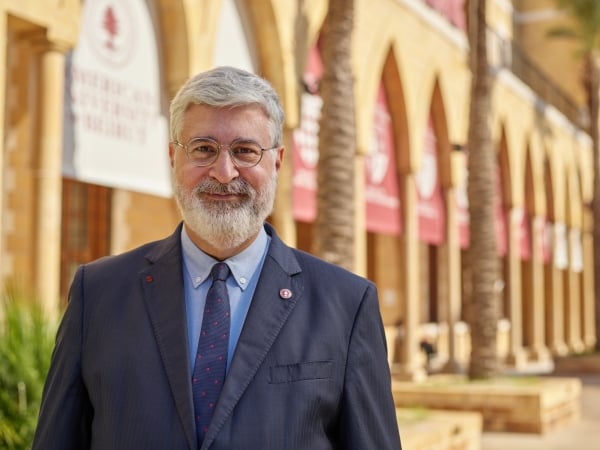
Dr. Fadlo Khuri, president of the American University of Beirut.
Khuri’s conversation with Inside Higher Ed, edited for length and clarity, is below.
Q: What have the past few months been like on the ground at AUB?
A: For the first several weeks, none of the strikes were that close to AUB. But that changed in September; for example, when they assassinated [former Hezbollah leader] Hassan Nasrallah, that was loud enough for us to hear. We had one student killed, one recent graduate killed, two staff killed and two students seriously injured. So we had tragic losses.
It was a very abnormal period for everyone. Classes were stop-and-go. We did a survey, and 90 percent of students felt there had been a major disruption in their ability to study, whether it was their concentration being interrupted, they were displaced, they didn’t have reliable internet, they were stressed because of their family. That’s a pretty high number.
There’s also the chaos of the city. The number of displaced people in Beirut grew from a few hundred thousand to 1.5 million. The university was surrounded by people who were displaced, who started to camp outside the university’s doors. One day, we had some folks encroaching on the university’s gates to a point where we couldn’t function. Even though [the government] had found housing for them, they decided to put up tents next to the university, possibly because they thought we wouldn’t get hit.
Meanwhile, we were trying to find accommodations for our own community. We were able to rent some facilities, make agreements with NGOs and partners. We cleared out off-campus dorms so we could house our staff. The goal was to not lose the semester, because the semester gives some hope. Even if [students] are stressed about an exam, they want to know there’s something to look forward to other than the next bombing.
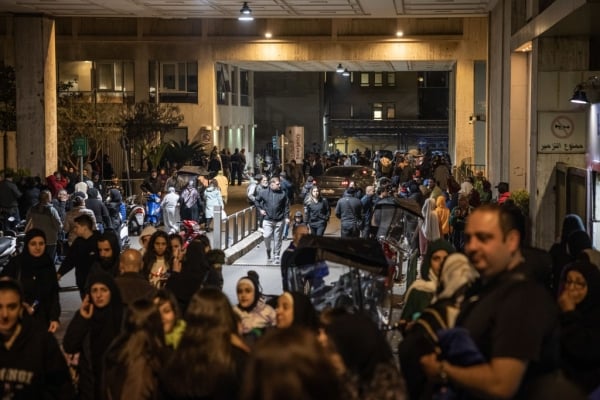
Displaced Beirut residents gather outside the AUB medical center to escape Israeli airstrikes.
Ed Ram/Getty Images
I don’t have any surveys done since hostilities ceased. But our latest data, which is probably no more than two weeks old, says more than 50 percent of students were displaced—not all of them because of their homes being hit, but many of them because of the safety situation in the country. And about 45 percent of the faculty and staff had either moved or were hosting multiple family members. Anytime you have numbers like that, it’s a major challenge. It’s hard to know how many more students will need financial aid, but it’s clearly going to be a significant increase. So it’s been a challenge from the educational perspective and the student perspective, but also from a financial perspective.
Q: Is that why you were on a fundraising trip?
A: Yes, to raise additional resources to be able to offset some of that, especially for financial aid. Because some people who needed some financial aid may need more, and others who didn’t need any might need total financial aid. We pride ourselves on the fact that we haven’t let kids drop out for purely economic reasons. But last year, we had 89 percent of our students getting some financial aid; 22 percent of those received full financial aid and another 67 percent averaged about half tuition. Any more is obviously not affordable for us. We’re the largest private employer in Lebanon, and we were approaching some equipoise when all of this happened. So we’re still trying to figure out what people need to get the students through, to get the faculty and staff paid without having to cut into their income.
I met with eight university and higher ed institution leaders in England, Ireland, Scotland, both U.S. coasts, Australia. I wanted a plan for our students in case we could not finish the semester or couldn’t start the next semester. We did raise some funds. We talked to foundations and other partners. But we’re not just fundraising, we’re also friend-raising: raising awareness of the precariousness of our situation. At the time, we had no clue there would be a ceasefire anytime soon; our thinking was, based on the U.S. elections, they wouldn’t get to it until the spring.
Q: Tell me about the efforts of AUB’s Center for Civic Engagement and Community Service.
A: We’re encouraging students not just to come here and go to class and go home and study and take the tests, but to really be a part of the community. This is something that took off in 2006 after Lebanon was caught in the middle of the Israel-Hezbollah war that lasted 35 days. Then you had the Syrian Civil War [in 2011], the uprising [in 2019], the port explosion [in 2020], the pandemic. So this is not [the center’s] first rodeo; they have a lot of experience in doing things that are proactive.
Already, the CCECS is starting to study the needs of the community as we pick up the pieces. We have well over 1,200 students who are involved, asking how they can help communities all across the country, either in setting up temporary health or educational or sheltering facilities, or directing people where to go, or doing food drives or vaccination drives. It’s critical in this period to give people some agency so they don’t feel helpless.
Q: AUB’s hospital has also played a big role in helping the injured. Do you see that as part of the university’s community service?
A: It’s very important to set that expectation, to give people a sense of agency, that we can do some good. We’ve been doing that since 1917, when the Ottoman Empire decided to close down AUB. It was Syrian Protestant College at the time, and Howard Bliss, who was the second president, convinced the Ottoman pasha for the region to reopen because of the importance of medical and dental care. He agreed after he saw that the hospital was neutral and helped everyone. And we have stuck to that tradition of treating everyone for 100-plus years. That’s part of the special trust that the people of the entire region have for this institution. I’m sure that if you ask people in Israel or Palestine or anywhere else in the Levant, if you had someone who was wounded, where would you want to go? They would tell you, AUB’s medical center.
Q: Do you worry it’s getting harder for once-untouchable institutions to maintain that neutrality?
A: Yes. We see the Israeli Defense Forces targeting hospitals in Gaza; Russia targets hospitals in the Ukraine. Unfortunately, what we’re seeing in this increasingly polarized world is health-care institutions, universities, childcare institutions are becoming less sacrosanct. So of course you’re worried. Still, and I don’t want to be arrogant to say this is a unique and special place, but we have had a tremendous resilience for more than 100 years. And I do think that the political price that one would pay, whoever you are, for hitting this particular hospital or campus would be quite high. As long as we maintain our neutrality, that’s all we can do.
Q: How do you prepare the university to face a future in which it’s possible that this kind of conflict keeps happening more frequently?
A: I think the only thing you can do is to tell people the truth. Fortunately, online teaching has moved up several notches since we first started dabbling in 2019. Don’t take my word for it; the faculty, deans, provost, even the students are saying the online courses we have are really quite superior. So far our applications for next year look quite healthy. They’re not quite as high as last year, and the component that’s down is the international students, which is not surprising. But there’s still time for them to apply, and I think if there’s this ceasefire and election of a president in the next couple of months, that will also pick up because it’ll be a harbinger of stability. But really, we have a world-class education, and we’re honest about the danger. We don’t want anyone risking their lives, but it’s not exactly the most stable country in the world and people know, for the most part, what they’re getting into.
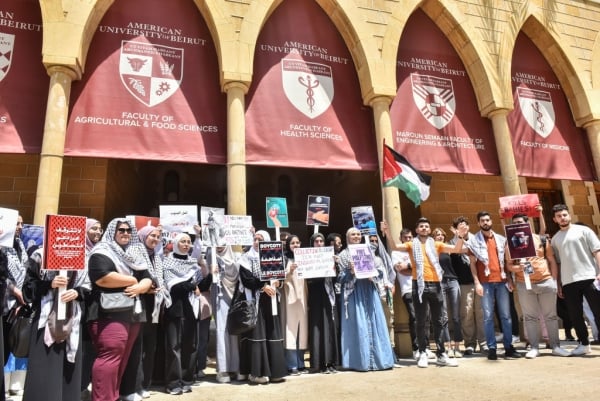
AUB students protest the Israeli attacks on Palestine in May.
Fadel Itani/NurPhoto via Getty Images
Q: There are dozens of American Universities across the world, and new ones being established in volatile areas: in Kyiv, Ukraine; in Kurdistan; in Baghdad. Is the mission and power of these American-style institutions fading in places like Beirut? Is it harder to run a university with the word “American” in the name?
A: You have to be very honest and say, we’re very proud to be an American university. But we’re really about shared values—secular, humanist, liberal values. Everyone has their own view; that’s what the American university should be about. It shouldn’t be about indoctrination. There are people with certain persuasions who love to portray us as the penetrating point of American foreign policy. But we don’t get our orders from the State Department or the White House; we have boards, and ours is chartered in New York. The trustees can hire and fire me, but they don’t tell us what to do.
You have to be very clear about your messaging, and your best messengers, honestly, are your students and your faculty and your staff. They’re the ones who create this atmosphere where people feel they can express themselves, from the furthest-apart extremes of opinion, and then come together to talk … real academic freedom, real freedom as well. That’s what we do. It’s uncomfortable for others. It can be uncomfortable for us, too. But it’s the right thing to do.


